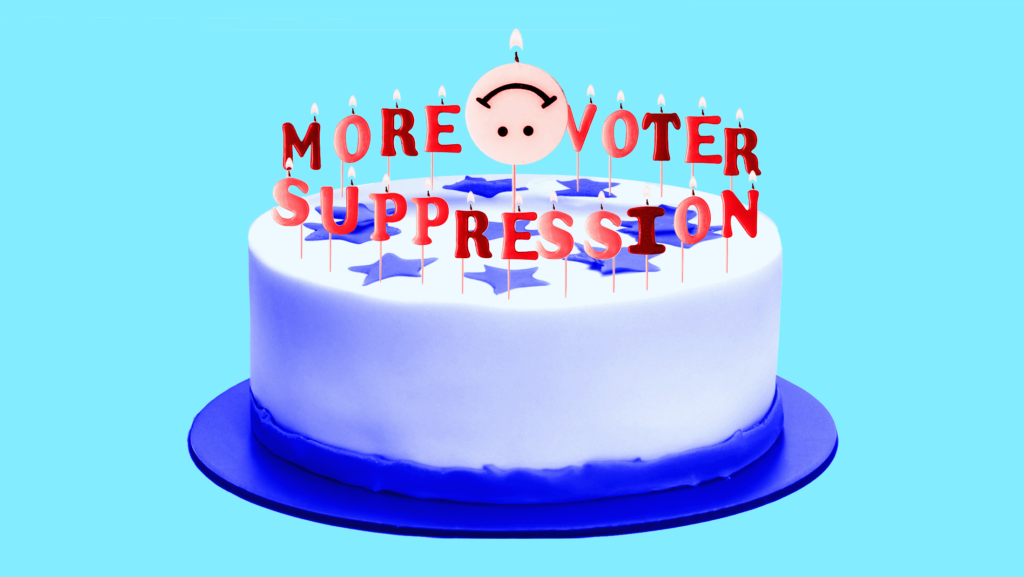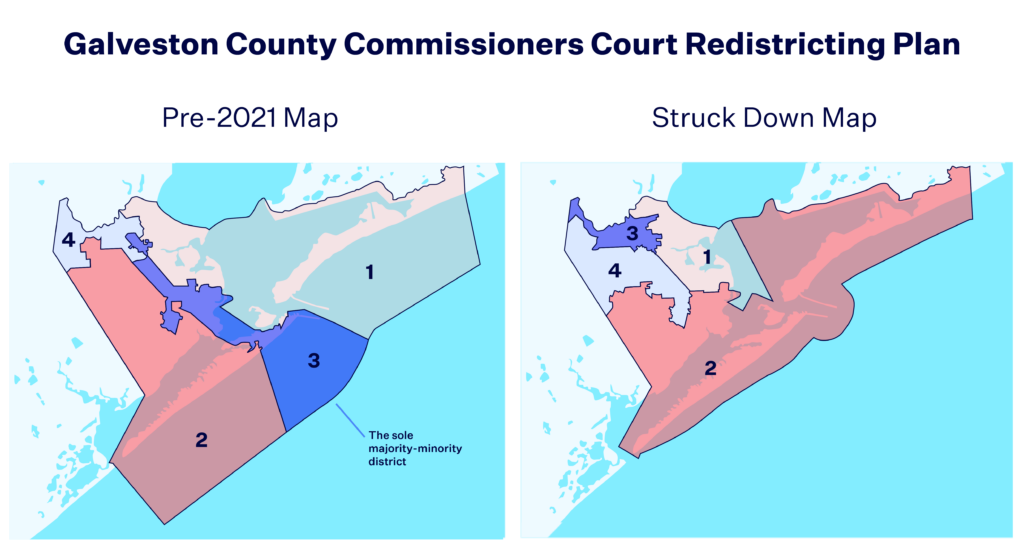In 2024, Republicans Resolve to Eviscerate the Voting Rights Act

As we all enter 2024 with new resolutions — for some of us it is to be a better friend, a kinder neighbor, or even kinder to ourselves — Republicans have made it very clear that their resolution for 2024 is no different than any other year: Eviscerate what is left of the Voting Rights Act.
Last year, voting rights advocates rejoiced after the U.S. Supreme Court issued its decision in Allen v. Milligan upholding Section 2 of the Voting Rights Act (VRA). Unfortunately, the threats to the law did not end with Allen. From Georgia to Texas , in courtrooms across the country, Republicans continue their attacks on the Voting Rights Act specifically singling out Section 2, a key portion of the landmark law that is crucial in fighting discriminatory maps and voting laws. Without Section 2, minority voters would be without recourse to fight unfair maps and practices that dilute minority voters’ voting power.
Republican officials, the Republican National Committee and Republican-appointed judges are organized in their efforts to continue to chip away at the 1965 law and are attempting to do so in three major ways: limiting who can bring lawsuits under Section 2, attempting to eliminate minority coalition districts under Section 2 and continuing to question Section 2’s constitutionality.
After a shocking and catastrophic ruling, Republicans continued efforts to limit who can bring lawsuits under Section 2.
Black voters in Arkansas will be without fair legislative districts for 2024 due to a catastrophic 2-1 ruling from the 8th U.S. Circuit Court of Appeals. Last November, the federal appeals court dismissed a challenge against the Arkansas House map after holding that voters and civil rights groups cannot bring claims under Section 2. This decision not only denied Black voters in Arkansas the chance to fight for a map that better represents the state’s Black population, but also made it so that minority voters across seven states — in Arkansas, Iowa, Minnesota, Missouri, Nebraska, North Dakota and South Dakota — will not be able to use Section 2 to fight unfair districts or discriminatory voting laws.
In practice, this means that in the 8th Circuit, only the U.S. attorney general, and not private groups, can bring claims under a key provision of the Voting Rights Act that prohibits discrimination in redistricting and voting. In legal terms, the ability of private groups and individuals to bring lawsuits is referred to as a private right of action.
Republican officials are now attempting to advance the theory that the Voting Rights Act does not contain a private right of action in other states that are not covered by the 8th Circuit as well. In a premier example of this, Republican officials out of Louisiana — in an effort to delay a fair map that allows Black voters to elect their candidates of choice in two districts as opposed to one district — asked the ultra-conservative 5th U.S. Circuit Court of Appeals to rehear a decision affirming that there is in fact a private right of action under the Voting Rights Act.
Republicans specifically asked the circuit to overturn part of a November ruling confirming the ability of private litigants (civil right groups, individual voters, etc.) to bring lawsuits under Section 2 of the Voting Rights Act. “This split of authority creates the untenable scenario where §2 private enforcement can occur in Louisiana, Mississippi, and Texas, but not in neighboring Arkansas,” their request for rehearing read.
Luckily, the 5th Circuit denied Louisiana Republicans’ cynical request and declined to overturn its precedent. Louisiana will now have a fair map for 2024 because this important precedent was upheld and a new map was ordered. Minority voters and civil rights organizations maintain the ability to bring lawsuits under Section 2 in the 5th Circuit which covers Mississippi, Louisiana and Texas.
Republicans are trying to do away with minority coalition districts under Section 2.
In another attempt to limit who can bring challenges under Section 2, Republicans are also trying to chip away at important precedent by arguing that different minority groups who vote similarly should not be protected under the Voting Rights Act.
In a lawsuit out of Galveston County, Texas, Black and Latino voters challenged a discriminatory map for the Galveston County Commissioners Court — the coastal county’s legislative body — arguing that the enacted map violates Section 2 by intentionally “denying Black and Hispanic voters an equal opportunity to participate in the political process and elect representatives of their choice by diluting their voting strength.”
In Galveston County, located just south of Houston, neither the county’s Black nor Latino populations are large enough to individually constitute a majority in a particular district but the two communities together form a politically cohesive coalition of minority voters that is protected under Section 2. As a remedy for this discriminatory plan, the voters asked the court to implement a map where Black and Latino voters can elect candidates of their choice.

The court struck down the map for violating Section 2 of the Voting Rights Act and ordered the county to enact a new map for the 2024 election. “This is not a typical redistricting case. What happened here was stark and jarring. The commissioners court transformed Precinct 3 from the precinct with the highest percentage of Black and Latino residents to that with the lowest percentage,” the order read.
A three judge panel on the ultra-conservative 5th Circuit even affirmed this ruling, but in the same order asked the entire 5th Circuit to reconsider its prior precedent. Previously, Republicans had argued that the Voting Rights Act does not protect minority-coalition districts. Now, the entire 5th Circuit is rehearing the case to consider this argument.
If adopted, this would be devastating for minority voters in the 5th Circuit, who would not be able to bring claims together. This is exceptionally important in a place like Galveston County where Black and Latino voters account for 40% of the county’s population but do not have the opportunity to elect a candidate of their choice despite voting cohesively and collectively experiencing “ongoing discrimination affecting Black and Latino voting participation.”
Republicans are not just trying to drastically weaken the Voting Rights Act, they are also trying to overturn the law.
In redistricting cases across the South, Republicans are making radical legal arguments in the wake of both Allen and Students For Fair Admissions v. Harvard (which ended affirmative action in higher education) to avoid drawing new, fair maps.
In Louisiana, Republicans tried to use the court’s ruling in the affirmative action case to argue that Section 2 — which Republican officials contend similarly requires classifying voters based on their race — may also no longer apply to Louisiana.
In Georgia, the Republican defendants are taking another page out of this playbook to argue that Section 2 “may very well be unconstitutional.” The Republican defendants in Georgia’s congressional and legislative redistricting cases notified the court that they are questioning the constitutionality of Section 2. In their notice, Republicans argued that the VRA requires “inherently race-based remedies,” which they argue are not justified nor “congruent and proportional to the exercise of congressional power under the Fourteenth and Fifteenth Amendments.”
Luckily, courts rejected the Republican officials’ arguments in both of these instances. In Georgia, the court wrote: “the Supreme [Court] recently rejected the same argument urged by the State of Alabama in Allen v. Milligan…Accordingly, the Court concludes that there is no merit to the affirmative defenses challenging the constitutionality of Section 2.”
While Section 2 is safe for now, the case challenging Georgia’s congressional map is currently on appeal in the 11th Circuit. It seems likely that Republicans will continue to argue that the law is not constitutional.
While many threats have fortunately been thwarted, it is clear that the Voting Rights Act is under attack.
Unfortunately, Section 2 is not the only frontier. Republicans are trying to invalidate rarely utilized potions of the law as well.
Just two weeks ago, the Republican National Committee and the Georgia Republican Party filed a motion to intervene in a lawsuit challenging Georgia’s absentee ballot application deadline arguing that the Voting Rights Act is unconstitutional. While this lawsuit specifically utilizes a separate and rarely used part of the Voting Rights Act, Republicans are taking the opportunity to argue that this part of the law “does not pass constitutional muster.”
Republicans’ full fledged assault on the Voting Rights Act is a shameful and relentless project that unfortunately will not cease in 2024. Thanks to the Voting Rights Act, Black voters in Alabama, Louisiana and Georgia will all have a more fair congressional map for the 2024 election. Without the VRA, Republicans will continue to use their mapmaking power to discriminate against voters of color and entrench their own power at the expense of the will of the voters.
The ability for voters to live in fair districts with non discriminatory voting laws relies on the existence of the Voting Rights Act — it is up to pro-voting groups and Democrats to continue to fight to preserve it.